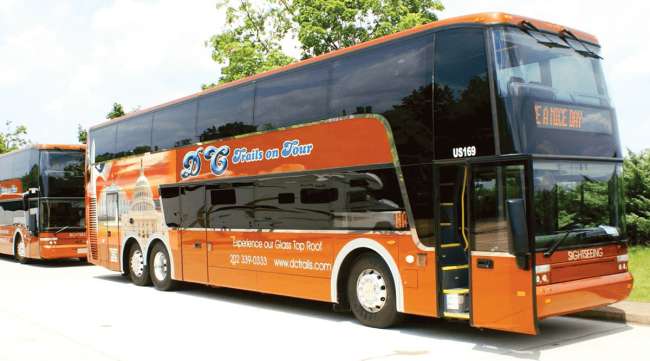Senior Reporter
Motorcoach Industry Seeks Federal Aid to Mitigate Losses

[Ensure you have all the info you need in these unprecedented times. Subscribe now.]
The 100-year-old over-the-road motorcoach industry is struggling for survival as most of the nation’s 36,000 buses are sitting in parking lots because of the COVID-19 pandemic at a time when they usually would be full of passengers.
“We’re in pretty bad shape, and without some kind of federal assistance in the next stimulus bill, which is coming out as we speak, this industry could lose 25% to 40% of its companies,” American Bus Association CEO Peter Pantuso told Transport Topics.
ABA is one of two national trade associations that represent the industry in Washington.
Some companies already are closing their doors. On July 16, Lakefront Lines, the largest bus company in Ohio, said it was shutting down.
“Due to the current impact of COVID-19 and future uncertainty, Coach USA has made the difficult decision to permanently cease operations of Lakefront Lines. Coach USA thanks our employees at Lakefront Lines for their years of committed service and wishes them good fortune in their future endeavors,” company spokesman Sean Hughes said.
Coach USA, the parent company of Lakefront Lines, also announced it’s shutting down two smaller companies, Butler Motor Transit and Central Cab, two Pennsylvania-based carriers that have operated for decades.
The bus industry is pinning its hopes for a temporary reprieve on help from Congress in the form of specific language in the next COVID-19 stimulus bill that would provide upward of $15 billion in federal grants and loans to keep the 3,000 bus companies afloat until there is a medical solution to the pandemic and people feel comfortable riding buses.
“We need to get into this stimulus bill. This industry needs to get some money; it needs to get some financial support. It needs really a bridge to carry it through to 2021. Otherwise, it’s not going to survive,” Pantuso said. Bus industry leaders still are shaking their heads as to why Congress excluded them from earlier stimulus bills when the airline industry received $25 billion, public transit agencies got $25 billion, and Amtrak received $1 billion.
The motorcoach industry is second to domestic airlines in moving people. ABA said that in 2018, privately owned motorcoaches transported 600 million people. The airlines flew 779 million, and Amtrak trains took 31.7 million people on its popular Northeast corridor runs and long-distance trains.

Pantuso
“We carry 20 times as many passengers as Amtrak. We don’t go to Capitol Hill on a regular basis, looking for big handouts. We’re not part of the government system like the airlines are, pulling into government-funded airports or Amtrak, which is a partly government system,” Pantuso said. “We don’t look for big handouts; we just get the job done. Congress has a key opportunity to stand behind the motorcoach industry, which is a key part of the transportation system.”
The decentralized motorcoach industry has dozens of family-run, generational businesses that were started in the 1920s, ’30s and ’40s that now are run by the grandchildren or great-grandchildren of the founders. Many have 15 to 100 buses, and the company names are well-known regionally.
The industry has several types of service. Charters are booked by schools, church groups, casinos, sports teams and Broadway theaters for specific trips to a venue.
Scheduled service carriers operate point-to-point routes between cities such as Washington and New York or Dallas and Houston. Shuttle services are buses set up by governments or corporations to bring employees from the suburbs into a downtown area or to a corporate campus for work.

Torres
Bill Torres of suburban Washington operates D.C. Trails and BestBus with his wife, Lilliana. Before the pandemic, the company’s 65 buses were full and a regular on streets and highways in the Mid-Atlantic and Northeast. But now he’s furloughed some employees and cut operations to stay in business.
“We’re plugging away, day by day,” Torres told Transport Topics. “We’re running, but it’s about 40% of what we should be running. This time of year, we should be close to 80% to 90% full in July. That’s $5.5 million in revenue lost in the last three or four months.” Torres said in an average year, the companies would generate more than $20 million in revenue.
Several key members of the House and Senate, including House Ways and Means Committee Chairman Richard Neal of Massachusetts and Sen. Jack Reed of Rhode Island, support legislation to include the motorcoach industry in the next stimulus bill.
Pantuso said he and his staff will push to be included.
“The motorcoach industry is a key part of the transportation network,” he said. “We move people from place to place, safely and on time, just like the airlines, like Amtrak, like transit. Now is the time for Congress and the Trump administration to step up and help.”
Want more news? Listen to today's daily briefing:
Subscribe: Apple Podcasts | Spotify | Amazon Alexa | Google Assistant | More




